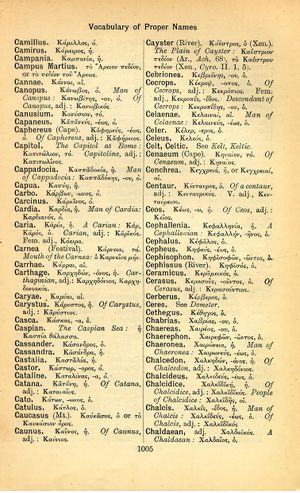Caria: Difference between revisions
(Names) |
(6_3) |
||
| Line 5: | Line 5: | ||
<b class="b2">Carian</b>, adj.: [[Καρικός]]. Fem. adj., [[Κάειρα]]. | <b class="b2">Carian</b>, adj.: [[Καρικός]]. Fem. adj., [[Κάειρα]]. | ||
}} | |||
{{Lewis | |||
|lshtext=<b>Cārĭa</b>: ae, f., = Καρία.<br /><b>I</b> A [[province]] in [[Asia]] Minor, [[south]] of [[Lydia]], [[now]] the provinces Aïdin and Mentesche in Ejalet Anadoli, Mel. 1, 2, 6; 1, 16, 1; 2, 7, 4; Plin. 5, 27, 29, § 103 sq.; Ter. Eun. 1, 2, 46; Cic. Fl. 27, 65; id. Or. 8, 24; 18, 57; id. Div. 1, 41, 91; Nep. Ages. 3, 1; Curt. 10, 10, 1 al.—<br /> <b>B</b> Hence,<br /> <b>1</b> Car, Cāris, a Carian, Cic. Fl. 27, 65; Nep. Dat. 1, 3.—Orig., the supposed [[father]] of the Carian [[race]], and [[inventor]] of [[augury]] by observing the [[fight]] of birds, Plin. 7, 56, 57, § 203.—And in <[[number]] opt="n">plur.</[[number]]>: Cāres, um, m., the inhabitants of [[Caria]], the Carians, Liv. 33, 18, 9.—Acc. Gr. Cārăs, Plaut. Curc. 3, 73; Liv. 38, 13, 7; 44, 15, 1; Sen. Ben. 5, 6, 1; Verg. A. 8, 725; Ov. M. 4, 297; 9, 645; [[notorious]] for [[their]] [[treachery]]; [[hence]] the [[proverbial]] [[expression]]: [[quid]]? de totā Cariā [[nonne]] hoc vestrā voce vulgatum est, si [[quid]] cum periculo experiri velis, in Care id potissimum esse faciendum? Cic. l. l.—<br /> <b>2</b> Cārĭcus, a, um, Carian: [[creta]], Varr. R. R. 1, 57, 1; Plin. 18, 30, 73, § 305.—Subst.: Cārĭca, ae (sc. [[ficus]]), a [[kind]] of [[dry]] [[fig]], Pall. 1, 26, 2; 1, 30, 4; Cic. Div. 2, 40, 84; Stat. S. 4, 9, 26; also for dried figs, in gen., Ov. M. 8, 674; id. F. 1, 185; Plin. 13, 5, 10, § 51.—<br /><b>II</b> A [[town]] in [[Caria]], called also [[Hydrela]], Liv. 37, 56, 3.—<br /><b>III</b> A harbor in [[Thrace]], Mel. 2, 2, 5. | |||
}} | }} | ||
Revision as of 08:22, 13 August 2017
English > Greek (Woodhouse)
Καρία, ἡ.
A Carian: Κάρ, Καρός, ὁ.
Carian, adj.: Καρικός. Fem. adj., Κάειρα.
Latin > English (Lewis & Short)
Cārĭa: ae, f., = Καρία.
I A province in Asia Minor, south of Lydia, now the provinces Aïdin and Mentesche in Ejalet Anadoli, Mel. 1, 2, 6; 1, 16, 1; 2, 7, 4; Plin. 5, 27, 29, § 103 sq.; Ter. Eun. 1, 2, 46; Cic. Fl. 27, 65; id. Or. 8, 24; 18, 57; id. Div. 1, 41, 91; Nep. Ages. 3, 1; Curt. 10, 10, 1 al.—
B Hence,
1 Car, Cāris, a Carian, Cic. Fl. 27, 65; Nep. Dat. 1, 3.—Orig., the supposed father of the Carian race, and inventor of augury by observing the fight of birds, Plin. 7, 56, 57, § 203.—And in <number opt="n">plur.</number>: Cāres, um, m., the inhabitants of Caria, the Carians, Liv. 33, 18, 9.—Acc. Gr. Cārăs, Plaut. Curc. 3, 73; Liv. 38, 13, 7; 44, 15, 1; Sen. Ben. 5, 6, 1; Verg. A. 8, 725; Ov. M. 4, 297; 9, 645; notorious for their treachery; hence the proverbial expression: quid? de totā Cariā nonne hoc vestrā voce vulgatum est, si quid cum periculo experiri velis, in Care id potissimum esse faciendum? Cic. l. l.—
2 Cārĭcus, a, um, Carian: creta, Varr. R. R. 1, 57, 1; Plin. 18, 30, 73, § 305.—Subst.: Cārĭca, ae (sc. ficus), a kind of dry fig, Pall. 1, 26, 2; 1, 30, 4; Cic. Div. 2, 40, 84; Stat. S. 4, 9, 26; also for dried figs, in gen., Ov. M. 8, 674; id. F. 1, 185; Plin. 13, 5, 10, § 51.—
II A town in Caria, called also Hydrela, Liv. 37, 56, 3.—
III A harbor in Thrace, Mel. 2, 2, 5.

